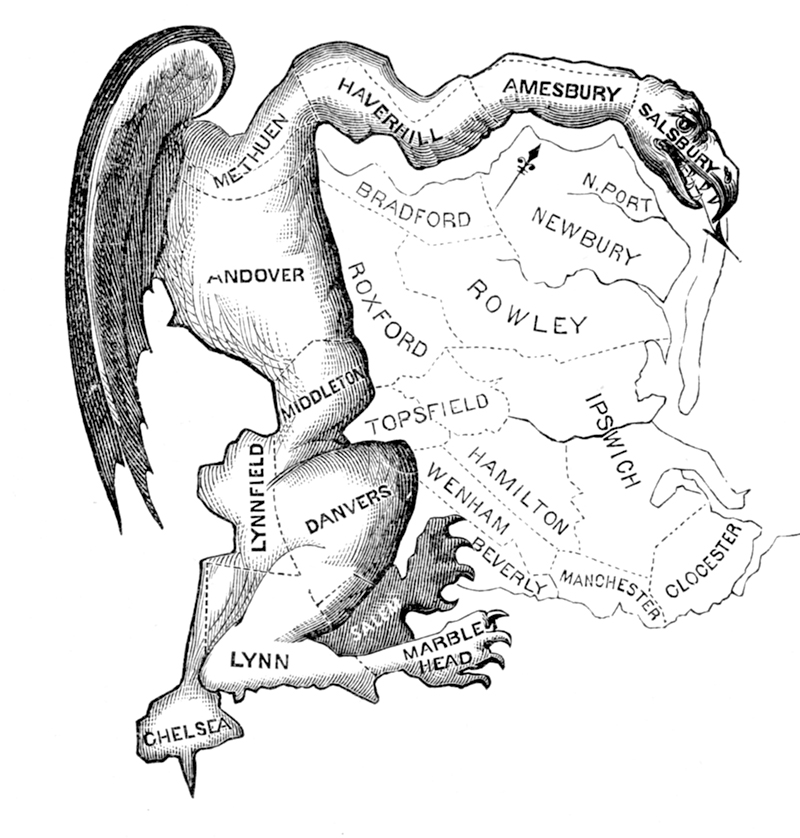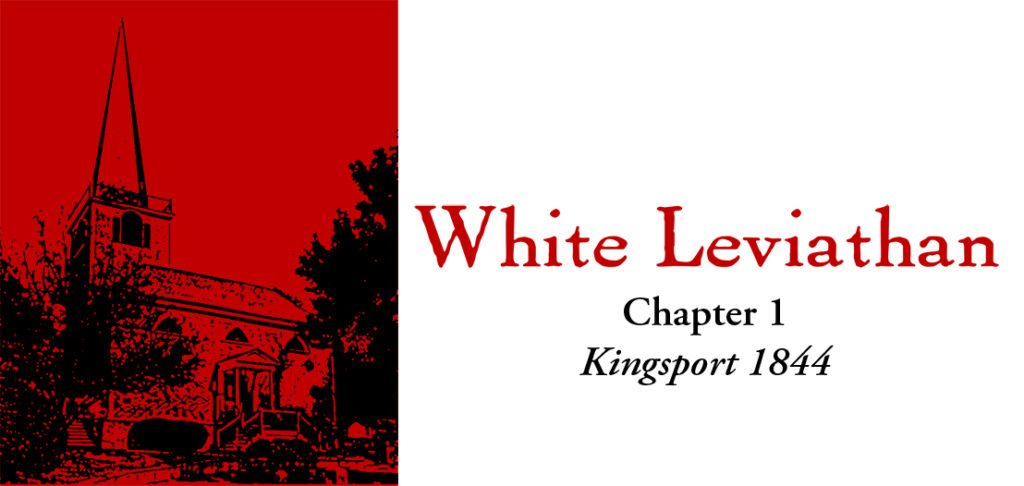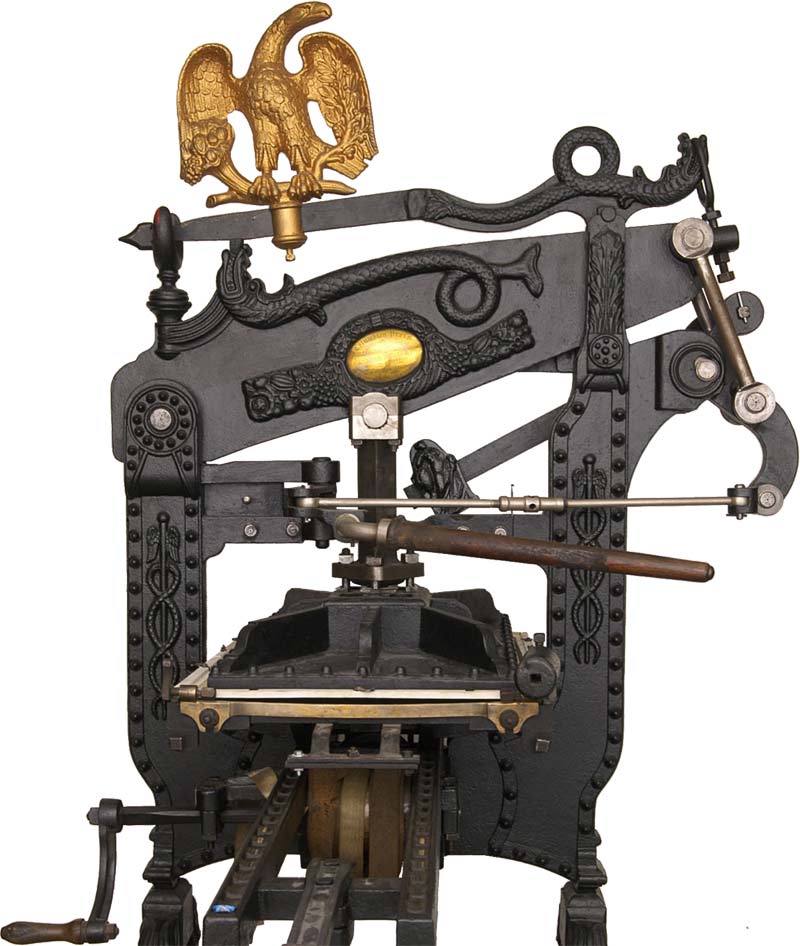Kingsport 1844: Kingsport Chronicle
- At July 19, 2021
- By Great Quail
- In Call of Cthulhu
 0
0
14) Kingsport Chronicle
704 Howard Street, Downtown. Est. 1829
A) In the Spirit of Horace Greeley
Founded in 1829 by industrialist Kirby Spencer and sold in 1839 to editor Graham Blaine, the Kingsport Chronicle is a small biweekly costing 5¢ an issue or $3.50 for a yearly subscription. Blaine’s brother Justin (Tobias Beckett’s father) married one of the Arkham Gedneys, so there’s a close relationship between the Kingsport Chronicle and the Arkham Advertiser. Blaine’s Whiggish politics have pushed the Chronicle farther left than its original leanings, and its abolitionist editorials have spurred numerous concerned letters from previous “loyal readers.” Blaine is also more ambitious than Spencer. The Kingsport Chronicle offers original investigative journalism and reporting on the arts and sciences. Although the Chronicle has endorsed Whig candidate Henry Clay in the upcoming presidential election, much to Blaine’s disappointment his fellow Kingsporters widely support James K. Polk.
The Chronicle’s only competitor is the Hollow Gazetteer, a Democratic biweekly with Masonic ties. Published from Carter Street in the Hollow, the Gazetteer is owned by Jonah Pickering, and vigorously supports the forcible opening of China, the annexation of Texas, and the wholesale takeover of Oregon Country from the British. It’s sympathetic to Southern interests, and occasionally reprints speeches from the likes of John C. Calhoun and James Henry Hammond. Pickering has recently announced his intentions to publish daily starting in 1845, and plans to rename his paper the Daily Mercury. Although Blaine envies his rival’s circulation and funding, he regards the name-change as a minor victory, as the Chronicle consistently refers to its rival as “the aptly-named Hollow Gazetteer.” Still, Pickering’s plan to charge 1¢ per issue worries Blaine, who lacks the equipment needed to compete with the “penny press.”
Kingsport also supports two smaller publications. The Kingsport Bee is a two-page weekly devoted to advertisements and bargains, published on Page Street and funded by local businesses. The Essex County Compass is a nautical gazette featuring shipping schedules, weather reports, and announcements of maritime promotions. Published in Harborside, the Compass covers the New England coast from Salem to Newburyport.
B) Personalities
The Kingsport Chronicle is owned and edited by Graham Blaine. Although he owns a lovely Federal home on the West Side, Blaine is usually found at the newspaper all hours of the day and night. He manages a small staff including two writers named Henry Blaney and Robert Osborne, a typesetter named Philomel Devereaux, and a printer’s devil named Keely Sharpe, a young African-American man related to Theodore S. Wright.
Graham Blaine
Age 45, Nationality: American, Birthplace: Kingsport 1799.
| STR 55 | CON 70 | SIZ 65 | DEX 60 | INT 85 |
| APP 70 | POW 85 | EDU 75 | SAN 80 | HP 13 |
| DB: +1D4 | Build: 1 | Move: 6 | MP: 17 | Luck: 65 |
Combat
| Brawl | 60% (30/12), damage 1D3+1D4 |
| Pistol | 60% (30/12), damage 1D8 |
| Dodge | 40% (20/8) |
Skills
Accounting 75%, Appraise 75%, Art/Craft (Journalism) 85%, Art/Craft (Poetry) 60%, Art/Craft (Printing) 80%, Charm 25%, Credit Rating 55%, Cthulhu Mythos 10%, Fast Talk 80%, History 75%, Law 60%, Library Use 90%, Listen 85%, Natural World 45%, Occult 35%, Persuade 80%, Psychology 60%, Read Lips 50%, Religion 75%, Renown 50%, Spot Hidden 85%, Stealth 25%, Whalecraft 10%.
Description
The grandson of Revolutionary War hero Argus Blaine, Graham Blaine is a handsome man in his mid-forties, possessing the aquiline nose and piercing eyes that have marked the Blaines since arriving on the Mayflower. His sandy hair has greyed, and his right arm has become weakened by premature arthritis, but Blaine still has a reputation among the ladies as a silver fox. Despite this, Blaine remains unwed, a confirmed bachelor who claims he’s “married to the Chronicle.” Blaine began his career as a poet in Arkham, publishing two books of verse before accepting a position at the Arkham Bulletin. He returned to Kingsport to work at Spencer’s Chronicle, purchasing the paper when the industrialist tired of competing with Pickering. The main reason the Chronicle stays afloat is Blaine’s personal fortune, and he would rather go broke than concede defeat to the Gazetteer.
Blaine the Journalist
Graham Blaine is genuinely offended by the darker shades of Kingsport’s colorful history, and believes that a free press is the most effective way of countering corruption and mendacity. This willingness to expose vice has not always endeared Blaine to his fellow Kingsporters. An editorial on the town’s indifference to the moral turpitude of the Cauldron earned him a death threat from Donovan Wreck, and his exposé of a “criminal sultan” in charge of Harborside gambling dens resulted in the murder of his horse, its bleeding heart nailed to the doorway of his home! Kingsport being as corrupt as any other port town, Blaine’s “bombshells” eventually fizzled as squibs, and things returned to normal as soon as politically expedient. (The so-called “criminal sultan” now sends fatuous invitations to Blaine for all manner of wild parties and orgies.)
Blaine has pushed the Chronicle to cover national affairs as well as local concerns. During the Amistad trial, he traveled to New Haven to interview Joseph Cinqué, and published a controversial editorial criticizing Harvard intellectuals for “capitalizing on the suffering of their fellow humans, viewing them not as Kings to inspire Justice, but as Pawns for spreading their Gospel.” He expressed an even stronger position on the Creole slave rebellion, excoriating the Tyler administration and adopting a pro-British stance that cost him dozens of subscribers. However, the only thing Blaine ever regrets printing is a series of outraged editorials about New England’s opium trade. The pieces stoked Kingsport’s growing anti-Chinese sentiment, and an angry mob burned down “Opium Row” on Silver Street, resulting in the death of sixteen people. The fact it prevented Boston’s Ming Tong from taking root in Kingsport is meager consolation; but Blaine knows this illicit power vacuum just created more opportunities for gangs like the Liberty Bells and the Powderhouse Ghouls.
Interestingly, the one progressive cause Blaine rejects is women’s suffrage—“Next they’ll expect to take up politics! The sooner a man gets from under a woman’s skirts, the better.” Nor does Blaine have any truck with the Temperance movement. “Those ‘pure-water army’ hypocrites! Scratch the surface of a teetotaler, and you’ll find a tyrant thirsty for the intoxicating rum of power.”
Blaine and His Young Gentleman
Graham Blaine is currently involved in a decade-long relationship with a younger man, a local lawyer and ardent voice in the abolitionist movement named George Clover. Necessarily discreet, the pair customarily trysts at the Clover’s residence in the Hollow. Despite their circumspection, most of their circle has guessed the arrangement, and refer to the couple as “Blaine and his young gentleman.”
| The Gay Nineteenth Century Although polite society rarely spoke openly about homosexuality, it was understood that some men were “confirmed bachelors,” and certain women had “close companions.” Indeed, it was considered somewhat normal to experiment with same-sex relationships when one was younger; it was just not discussed, and one was expected to grow out of it. To remain attracted to the same sex into adulthood was considered a “perversion.” Virtually all nineteenth-century terms for gay men are offensive by today’s standards; and the word “homosexual” had yet to be coined. The most commonly-used slang in 1844 was “molly,” a British term that denotes an effeminate man. Male brothels were known as molly-houses. The slang “poof” was also used, as was “backgammon player.” The more formal terms were sodomite and pederast, the latter suggesting a distinct age difference. Navigating this world took some caution. A cultured gentleman such as Graham Blaine might signal his interest using coded language and classical allusions, such as “seeking an unpaid male traveling companion,” or “looking for a like-minded friend with a passion for Greek philosophy.” Interestingly, historical evidence suggests that the lower classes, particularly fringe criminal elements, were more accustomed to frank discussions of queer sexuality, and “she-males” were a popular type of prostitute in the nineteenth century. And of course, “buggery” was a common subject among sailors, the topic of off-color sea shanties and quips such as “Ashore it’s wine, women, and song; aboard it’s rum, bum, and bacca.” (Recall Winston Churchill’s reputed disparaging of Navy traditions as “rum, sodomy and the lash.”) |
Blaine and Whaling
Graham Blaine has a particular bias against the whaling industry, a prejudice that arises from two sources. First, he finds the practice barbaric—“This wholesale slaughter of whales is a savage affair, oiling the gears of Moloch’s industrial tyranny.” His second reason is considerably less noble. Blaine was bilked out of shares in an early whaling concern by the legal subterfuge of the Tuttle clan. If he hadn’t been so easily duped, he’d be rolling in money; a fact hammered home every time a Kingsport cooper seals a barrel of oil. Blaine would do almost anything to find a weakness in the Tuttle dynasty, something he can exploit to humiliate Kingsport’s most wealthy and secretive family. Of course, he can’t appear too transparent, lest his hypocrisy be exposed. So what a perfect opportunity he’s found in his eager nephew!
C) Visiting the Press
The Kingsport Chronicle is published from a two-story clapboard house on Howard Street. The majority of the floor is occupied by the printing press, chase bed, and type drawers. The press is a duplicate of a Columbian Hand Press, dating from 1829 and sporting an eagle-shaped counterweight. Ornate but cumbersome, the cast-iron device must be operated manually. Blaine hopes to replace it with a steam-powered cylinder press similar to the Koenig recently purchased by Pickering. Three offices are located on the second floor, two used by the staff and the third reserved for Blaine himself. Another second-floor room contains supplies.
Columbian Hand Press
The walls of the pressroom are hung with framed special editions and noteworthy articles, including Blaine’s piece in the Arkham Bulletin first describing—and inadvertently naming— Kingsport’s Cauldron; an essay calling for sweeping reforms of the Bureau of Indian Affairs that was reprinted in Horace Greeley’s New-York Tribune; Blaine’s interview with Joseph Cinqué and Roger Sherman Baldwin; and a rousing polemic against Andrew Jackson, (unpopularly) published the day before the president’s visit to Kingsport in 1833. There’s also a showcase of his more colorful death threats, which Blaine refers to as his “love letters.”
Blaine’s office contains a battle-scarred Kingsport Militia flag that belonged to his grandfather, and two framed newspaper pages: Edgar Allan Poe’s scathing review of Blaine’s recent poetry collection, Miskatonic Musings; and Elkanah Tisdale’s famous cartoon of the Essex County “Gerry-Mander,” first published in the Columbian Centinel in 1812. The political cartoon fascinated the young Graham Blaine, and everyone entering his office for the first time is subjected to the same pompous declaration—“That cartoon was my first inkling that the pen was truly mightier than the sword. I became a journalist to fight the very same dragons of corruption and malfeasance so cleverly depicted by Mr. Tisdale!”
 Tisdale’s Gerry-Mander, with the fictional town of Marblehead where Kingsport should be!
Tisdale’s Gerry-Mander, with the fictional town of Marblehead where Kingsport should be!
D) Programmed Events
Although the player characters are free to visit the press during its regular business hours, there is only one Programmed Event scheduled for Howard Street.
October 28, 4:00 pm: Tobias Beckett Meets His Uncle
Tobias Beckett has been instructed meet his uncle shortly after arriving in Kingsport. The elder Blaine is overjoyed to see his nephew, asking after his health, his family, and his general state of mind—after all, he’s about to ship out for the Pacific! He’ll give Beckett a tour of the pressroom, then usher him into his office, reciting his usual line about the “Gerry-Mander” cartoon and pointing to the Kingsport Militia flag—“That was your great-grandfather’s flag. Never forget you have the blood of a Revolutionary flowing in your veins!” Offering his nephew a seat, he begins discussing the assignment, rehashing the news described in Handout: Letter from Blaine to Beckett. Blaine suggests a list of things for Beckett to accomplish before settings sail. He should visit Elijah Watts at St. Erasmus (Encounter 4), research the Quiddity’s past voyages at the Custom House (Encounter 10), and interview Liam Teague at Professor Riddle’s Cabinet of Curiosities (Encounter 27). He may also want to snoop around the Tuttle Shipyard (Encounter 7), the Congregational Church (Encounter 23), or the office of Sleet, Baker & Blood (Encounter 26)—“albeit quietly, lad quietly!”
A strange expression crosses Blaine’s face, and he hesitates before continuing—“And one last item, something new. I have it on good authority that the reclusive Captain Joab recently paid a visit to Kingsport’s famous house of ill repute. Certainly not what I’d expect from the man, but there it is. Given that sailors like to run their mouths to women, and harlots by nature ‘have a price,’ you may wish to swallow your pride and ‘investigate’ this unpleasant development. But be warned, lad—the Starry Busk is expensive, and it won’t do to look like a common jack. Anyway, just a thought.”
Reaching into his desk, Blaine produces a coin purse and hands it to his nephew. Inside are seventeen silver eagles ($17), more than enough to buy blankets, clothing, tobacco and other supplies. Of course, Beckett will be paid “handsomely” for his story upon returning, but that’s a matter for “another time.” Blaine reminds his nephew that “Once you have the story, you can jump ship and head home. Maybe even see the Sandwich Islands!” When business has been concluded, Blaine offers to treat Beckett to dinner and libations at Black Joe’s Tavern, where members of the Miskatonic Valley Anti-Slavery League gather every Monday for “molasses beer and spirited conversation.” Although the tavern is not frequented by “Tuttles or whalers,” it’s still best if “Tobias” doesn’t mention that he’s Graham’s nephew. If the player character declines the invitation, Blaine shakes Beckett’s hand and informs his nephew, “You know I can’t see you off at the docks, so come by the office if you need anything. You are doing God’s work.”
White Leviathan > Chapter 1—Kingsport 1844
[Back to “Downtown” | White Leviathan TOC | Forward to Encounter 15, Public Library]
Author: A. Buell Ruch
Last Modified: 20 October 2021
Email: quail (at) shipwrecklibrary (dot) com
White Leviathan PDF: [TBD]


